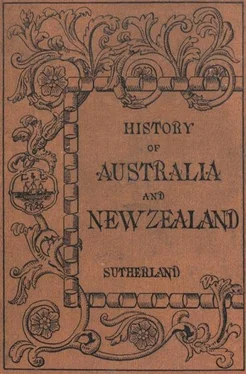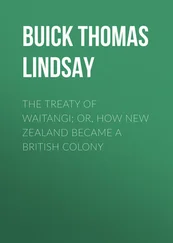3. Australian Bight.—Here he changed the object of his journey, and made efforts to go along the shores of the Great Australian Bight, in order to reach West Australia. Three times he rounded Streaky Bay; but in that bare and desert land the want of water was an insuperable obstacle, and each time he was forced to retreat to less desolate country. Governor Gawler now sent word to him to return to Adelaide, as it seemed madness to make further efforts; but Eyre replied that to go back without having accomplished anything would be a disgrace he could never endure. Seeing that his only chance of reaching West Australia was to push rapidly forward with a simple and light equipment, he sent back the whole of his party except Mr. Baxter, his black servant Wylie, and the other two natives; and taking with him a few horses, carrying a supply of water and provisions for several weeks, he set out to follow the coast along the Great Australian Bight. His party had to scramble along the tops of rough cliffs which everywhere frowned from three hundred to six hundred feet above the sea; and if they left the coast to travel inland they had to traverse great stretches of moving sands, which filled their eyes and ears, covered them when asleep, and, when they sat at meals, made their food unpleasant. But they suffered most from want of water; for often they were obliged to walk day after day beneath a broiling sun when all their water was gone, and not a drop to be seen on the burning soil beneath them. On one occasion, after they had thus travelled 110 miles, the horses fell down from exhaustion, and could not be induced to move. Eyre and a native hastened forward; but, though they wandered for more than eighteen miles, they saw no sign of water, and when darkness came on they lay down, with lips parched and burning, and tossed in feverish slumber till morning. At early dawn they perceived a ridge of sand-hills not far away, and making for them they found a number of little wells—places where the natives had dug into the sand for six or eight feet, and so had reached fresh water. Here Eyre and his black companion drank a delicious draught, and hastened back with the precious beverage to revive the horses. The whole party was then able to go forward; and there, around these little waterholes, Eyre halted for a week to refresh his men and animals before attempting another stretch of similar country. They saw some natives, who told them that there was plenty of water farther on, and when Eyre set out again he carried very little with him, so as not to overburden the horses. But after sixty miles of the desert had been traversed without meeting any place in which water was to be found, he became alarmed, and sent back Mr. Baxter with the horses to bring up a better supply, whilst he himself remained to take charge of the baggage. When Baxter returned they all set forward again, and reached a sandy beach, where they had great difficulty in preventing the horses from drinking the sea-water, which would certainly have made them mad. As it was, two of them lay down to die, and part of the provisions had to be abandoned. Baxter now grew despondent, and wished to return; but Eyre was determined not yet to give up. Onward they toiled through the dreary wilderness, and two more horses fell exhausted; 126 miles from the last halting-place, and still no signs of water. Still onward, and the horses continued to drop by the way, Baxter constantly entreating Eyre to return. It was only after a journey of 160 miles that they came to a place where, by digging, they could obtain fresh water in very small quantities. They were now forced to eke out their failing provisions by eating horseflesh. Baxter was altogether disheartened; and, if to return had not been as dangerous as to go forward, Eyre would himself have abandoned the attempt. The three natives, however, were still as light-hearted and merry as ever; whilst the food lasted they were always full of frolic and laughter.
4. Death of Baxter.—Each evening Eyre formed a little camp, loaded the muskets, and laid them down ready for use in case of an attack by the blacks; the horses were hobbled, and set free to gather the little vegetation they could find. But this forced Eyre and Baxter to keep watch by turns, lest they should stray so far as to be lost. One evening when Eyre had taken the first watch, the horses, in their search for grass, had wandered about a quarter of a mile from the camp. He had followed them, and was sitting on a stone beneath the moonlight, musing on his gloomy prospects, when he was startled by a flash and a report. Hastening to the camp, he was met by Wylie, who was speechless with terror, and could only wring his hands and cry: “Oh, massa”. When he entered, he saw Baxter lying on his face, whilst the baggage was broken open, and scattered in all directions. He raised the wounded man in his arms, but only in time to support him as his head fell back in death. Then placing the body on the ground, and looking around him, he perceived that two of his natives had plundered the provisions, shot Mr. Baxter as he rose to remonstrate with them, and had then escaped. The moon became obscured, and in the deep gloom, beside the dead body of his friend, Eyre passed a fearful night, peering into the darkness lest the miscreants might be lurking near to shoot him also. He says, in his diary: “Ages can never efface the horrors of that single night, nor would the wealth of the world ever tempt me to go through a similar one”. The slowly-spreading dawn revealed the bleeding corpse, the plundered bags, and the crouching form of Wylie, who was still faithful. The ground at this place consisted of a great hard sheet of rock, and there was no chance of digging a grave; so Eyre could only wrap the body in a blanket, leave it lying on the surface, and thus take farewell of his friend’s remains.
5. Arrival at King George’s Sound.—Then he and Wylie set out together on their mournful journey. They had very little water, and seven days elapsed before they reached a place where more was to be obtained. At intervals they could see the murderers stealthily following their footsteps, and Eyre was afraid to lie down lest his sleep should prove to have no awaking; and thus, with parching thirst by day, and hours of watchfulness by night, he slowly made his way towards King George’s Sound. After a time the country became better; he saw and shot two kangaroos, and once more approached the coast. His surprise was great on seeing two boats some distance out at sea. He shouted and fired his rifle, without attracting the attention of the crews. But, on rounding a small cape, he found the vessel to which these boats belonged. It was a French whaling ship; and the two men, having been taken on board, were hospitably entertained for eleven days. Captain Rossiter gave them new clothes and abundance of food; and when they were thoroughly refreshed, they landed to pursue their journey. The country was not now so inhospitable; and three weeks afterwards they stood on the brow of a hill overlooking the little town of Albany, at King George’s Sound. Here they sat down to rest; but the people, hearing who they were, came out to escort them triumphantly into the town, where they were received with the utmost kindness. They remained for eleven days, and then set sail for Adelaide, which they reached after an absence of one year and twenty-six days.
This expedition was, unfortunately, through so barren a country that it had but little practical effect beyond the additions it made to our geography; but the perseverance and skill with which it was conducted are worthy of all honour, and Eyre is to be remembered as the first explorer who braved the dangers of the Australian desert.
6. Sturt.—Two years after the return of Eyre, Captain Sturt, the famous discoverer of the Darling and Murray, wrote to Lord Stanley offering to conduct an expedition into the heart of Australia. His offer was accepted; and in May, 1844, a well-equipped party of sixteen persons was ready to start from the banks of the Darling River. Places which Sturt had explored sixteen years before, when they were a deep and unknown solitude, were now covered with flocks and cattle; and he could use, as the starting-place of this expedition, the farthest point he had reached in that of 1828. Mr. Poole went with him as surveyor, Mr. Browne as surgeon, and the draughtsman was Mr. J. MʻDouall Stuart, who, in this expedition, received a splendid training for his own great discoveries of subsequent years. Following the Darling, they reached Laidley’s Ponds, passed near Lake Cawndilla, and then struck northward for the interior. The country was very bare—one dead level of cheerless desert; and when they reached a few hills which they called Stanley Range, now better known as Barrier Range, Sturt, who ascended to one of the summits, could see nothing hopeful in the prospect. How little did he dream that the hills beneath him were full of silver, and that one day a populous city of miners should occupy the waterless plain in front of him! In this region he had to be very careful how he advanced, for he had with him eleven horses, thirty bullocks, and two hundred sheep, and water for so great a multitude could with difficulty be procured. He had always to ride forward and find a creek or pond of sufficient size, as the next place of encampment, before allowing the expedition to move on; and, as water was often very difficult to find, his progress was but slow. Fortunately for the party, it was the winter season, and a few of the little creeks had a moderate supply of water. But after they had reached a chain of hills, which Sturt called the Grey Range, the warm season was already upon them. The summer of 1844 was one of the most intense on record; and in these vast interior plains of sand, under the fiery glare of the sun, the earth seemed to burn like plates of metal: it split the hoofs of the horses; it scorched the shoes and the feet of the men; it dried up the water from the creeks and pools, and left all the country parched and full of cracks. Sturt spent a time of great anxiety, for the streams around were rapidly disappearing; and, when all the water had been dried up, the prospects of his party would, indeed, be gloomy. His relief was therefore great when Mr. Poole found a creek in a rocky basin, whose waters seemed to have a perennial flow. Sturt moved forward, and formed his depôt beside the stream; and here he was forced to remain for six weeks. For it appeared as though he had entered a trap; the country before him was absolutely without water, so that he could not advance; while the creeks behind him were now only dry courses, and it was hopeless to think of returning. He made many attempts to escape, and struck out into the country in all directions. In one of his efforts, if he had gone only thirty miles farther, he would have found the fine stream of Cooper’s Creek, in which there was sufficient water for the party; but hunger and thirst forced him to return to the depôt. He followed down the creek on which they were encamped, but found that, after a course of twenty-nine miles, it lost itself in the sand.
Читать дальше












